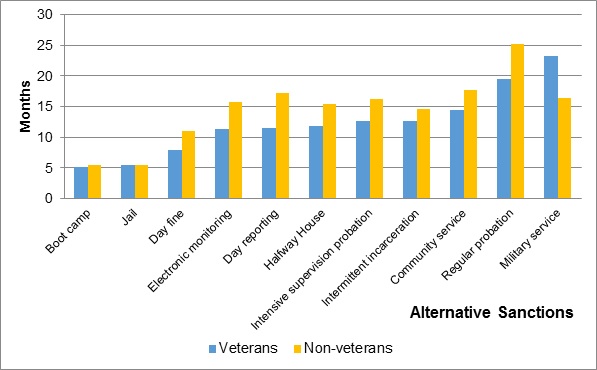


 There are more than 140,000 military veterans incarcerated in US prisons, many of whom have been sentenced for violent and sexual crimes. But given their military experience, do veterans find prison to be less punitive compared to non-veterans? In new research, David C. May, Kristen L. Stives, Makeela J. Wells, and Peter B. Wood surveyed prisoners from six prisons to determine their ‘exchange rate’ – how many months a person is willing to serve of an alternative sanction to avoid a 12 month prison sentence. They find that veteran inmates were willing to serve almost twice as much time in the military to avoid prison as non-veteran inmates, and that among non-veterans, Blacks viewed the military as being more punitive than prison.
There are more than 140,000 military veterans incarcerated in US prisons, many of whom have been sentenced for violent and sexual crimes. But given their military experience, do veterans find prison to be less punitive compared to non-veterans? In new research, David C. May, Kristen L. Stives, Makeela J. Wells, and Peter B. Wood surveyed prisoners from six prisons to determine their ‘exchange rate’ – how many months a person is willing to serve of an alternative sanction to avoid a 12 month prison sentence. They find that veteran inmates were willing to serve almost twice as much time in the military to avoid prison as non-veteran inmates, and that among non-veterans, Blacks viewed the military as being more punitive than prison.
One in eight Americans has served in the military. In 2004, there were 3.4 million people enlisted, and 1.4 million were on active duty. Military enlistment has generally been declining over previous decades but those most likely to enlist are males, people from the southern United States, and those from lower economic backgrounds.
Military personnel also make up approximately 10 percent of the prison population. There were 140,000 military veterans incarcerated in United States’ prisons in 2004. Of the military veterans in prison, the majority (59 percent) were from the Army. Despite the large number of military veterans in prison, little is known about this population. In new research, we find that veterans – along with non-veterans – viewed alternative sanctions such as probation to be less punitive compared to prison. Veterans, however, were willing to serve almost twice as long in the military to avoid prison time compared to non-veterans.
Although the incarceration rate of non-veterans is twice as high as the incarceration rate for veterans, veterans are more likely to be incarcerated for violent crimes and those of a sexual nature than non-veterans. However, veterans on average complete prison sentences that are 50 months longer than non-veterans for violent crimes. Veterans are also usually older than non-veterans when they are incarcerated. The average inmate is in his early 30s but the average veteran is in his mid-50s. Both populations have a high incarceration rate of Blacks and Hispanics compared to Whites.
Measuring differences between veterans and non-veterans
Given the differences between veterans and non-veterans, in our research we posed two questions. Will veteran inmates find prison less punitive than nonveteran inmates? Does the impact of race and military service on perceptions of the punitiveness of prison vary by the alternative sanction in question? To measure punitiveness, exchange rates were used. Exchange rates are how many months a person is willing to serve of an alternative sanction to avoid a 12 month prison sentence in a medium security prison. Alternative sanctions include boot camp, probation, day fines, day reporting, electronic monitoring, and intensive supervision probation amongst others. If a person is willing to serve more than 12 months of an alternative sanction instead of prison, this means that prison is seen as a more severe punishment. If a person is willing to serve less than 12 months of an alternative sanction instead of prison, this means that prison is viewed as less severe than the alternative.
Inmates from six minimum-, medium-, and maximum-security prisons in a Midwestern state were selected to complete a 15-page survey. The survey asked about their perceptions of the punitiveness of prison, experiences with programs offered in prison, and personal information such as their age, race, marital status, and military experience. The findings of this study are based on the participation of 1,164 inmates. Of those inmates, 117 (10.1 percent) were veterans and 1,047 (89.9 percent) were non-veterans.
Veterans prefer alternative sanctions to prison
Both veterans and non-veterans viewed boot camp, jail, and day fines as more punitive than prison. For instance, veterans were only willing to serve 5.08 months of boot camp compared to 12 months in prison. Both groups also generally agreed that alternative sanctions such as regular probation and community service were less punitive than prison; therefore, they were willing to spend more than 12 months completing these sanctions.
Figure 1 – Average exchange rates of veterans and non-veterans

However, there were differences between the length of time veterans and non-veterans were willing to serve on the alternative sanctions. Veteran inmates were willing to serve almost twice as much time in the military to avoid prison as non-veteran inmates. Veteran inmates were willing to serve less time than nonveteran inmates for each of the alternative sanctions to avoid 12 months in prison; five of these differences were statistically significant. Veterans were only willing to serve more than 12 months for four alternative sanctions- intensive supervision probation, day reporting, community service, and regular probation.
Our study also found that there were differences between White and Black veterans and non-veterans. Black non-veterans were different from any other group (White veterans, White non-veterans, and Black veterans) in that they were willing to serve less time in the military. They viewed the military as more punitive than prison, and were only willing to serve an average of 11.48 months in the military to avoid 12 months in prison. They also perceived a greater number of alternative sanctions as more punitive than prison than any other group. Black non-veterans were willing to serve less than 12 months on 8 of the 11 alternative sanctions, compared to 3 or less for other groups.
The findings from this study largely confirm previous research of exchange rates for veterans and non-veterans. Veteran inmates viewed prison as less punitive compared to nonveteran inmates. Non-veterans were willing to serve more than 12 months for a greater number of alternative sanctions compared to veterans. The picture is further complicated when considering race. Black veterans were different from other groups in the sample and more research needs to be done to understand the interaction between race and military status. Future work should continue to explore this area.
This article is based on the paper, ‘Does Military Service Make the Experience of Prison Less Painful? Voices From Incarcerated Veterans’, in Criminal Justice Policy Review.
Featured image credit: Niklas Morberg (Flickr, CC-BY-NC-2.0)
Please read our comments policy before commenting.
Note: This article gives the views of the author, and not the position of USAPP – American Politics and Policy, nor the London School of Economics.
Shortened URL for this post: http://bit.ly/2gZ6Weq
_________________________________
 David C. May – Mississippi State University
David C. May – Mississippi State University
David C. May is a professor in the Department of Sociology at Mississippi State University. He received his PhD in Sociology with emphasis in Criminology and Deviant Behavior from Mississippi State University in 1997. He has published numerous articles in the areas of responses to school violence, perceptions of the severity of correctional punishments, fear of crime, and weapon possession in leading journals such as Justice Quarterly, The Prison Journal, Crime and Delinquency and books examining perceptions of the punitiveness of prison, fear of crime, school safety, and the causes of gun ownership and possession among male delinquents.
 Kristen L. Stives – Mississippi State University
Kristen L. Stives – Mississippi State University
Kristen L. Stives is a doctoral student in the Department of Sociology at Mississippi State University. Her research examines issues in corrections, sex offender registration, predictors of delinquency, and the challenges of prison life.
 Makeela J. Wells – Mississippi State University
Makeela J. Wells – Mississippi State University
Makeela J. Wells is a doctoral candidate in the Department of Sociology at Mississippi State University. Her research examines sentencing disparities for drug offenders, predictors of delinquency, and race.
 Peter B. Wood – Eastern Michigan University
Peter B. Wood – Eastern Michigan University
Peter B. Wood is professor of Sociology in the Department of Sociology, Anthropology, and Criminology at Eastern Michigan University. His research includes the study of factors that motivate and maintain habitual offending, and issues associated with correctional policy and practice. His work has appeared in Criminology, Justice Quarterly, Journal of Research in Crime and Delinquency, Punishment and Society, The Prison Journal, Crime and Delinquency, Journal of Offender Rehabilitation, Journal of Criminal Justice, and Deviant Behavior.




It is unfair to ask our young men who serve time to kill without conscious and return to society without issues or proper therapy, and send them to prison for anything the military trained them to do!!!! Given a chance outside of prison with monitoring is much more fair than expecting their mindset to just be automatically fixed from the war that they were placed in that gave everyone their freedom